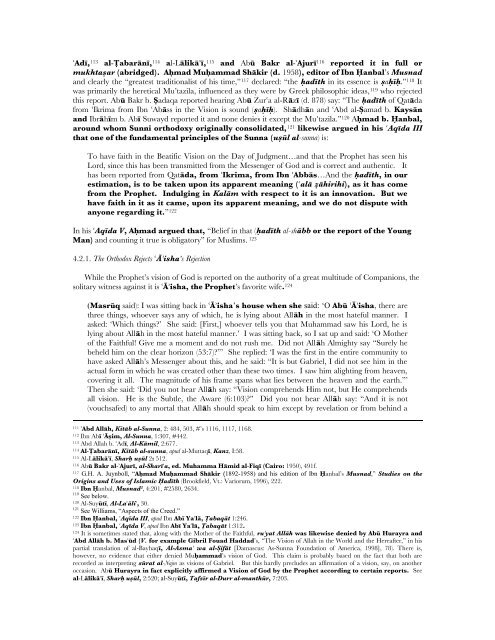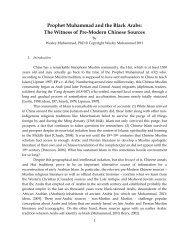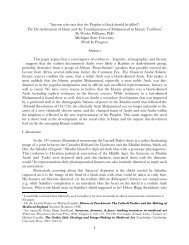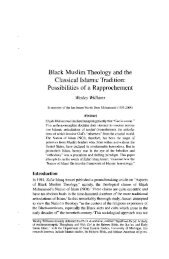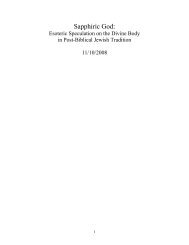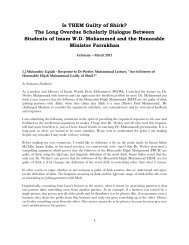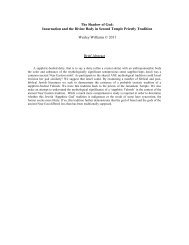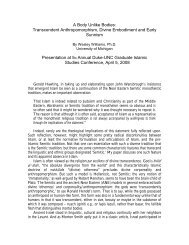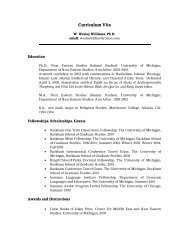Transcendent Anthropomorphism - Dr. Wesley Muhammad
Transcendent Anthropomorphism - Dr. Wesley Muhammad
Transcendent Anthropomorphism - Dr. Wesley Muhammad
You also want an ePaper? Increase the reach of your titles
YUMPU automatically turns print PDFs into web optimized ePapers that Google loves.
#AdÊ, 113 al-•abar§nÊ, 114 al-L§lik§"Ê, 115 and Abå Bakr al-"AjurÊ 116 reported it in full or<br />
mukhtaßar (abridged). AÈmad MuÈammad Sh§kir (d. 1958), editor of Ibn \anbal’s Musnad<br />
and clearly the “greatest traditionalist of his time,” 117 declared: “the ÈadÊth in its essence is ßaÈÊÈ.” 118 It<br />
was primarily the heretical Mu’tazila, influenced as they were by Greek philosophic ideas, 119 who rejected<br />
this report. Abå Bakr b. ‘adaqa reported hearing Abå Zur#a al-R§zÊ (d. 878) say: “The ÈadÊth of Qat§da<br />
from #Ikrima from Ibn #Ab§ss in the Vision is sound (ßaÈÊÈ). Sh§dh§n and #Abd al-‘amad b. Kays§n<br />
and Ibr§hÊm b. AbÊ Suwayd reported it and none denies it except the Mu#tazila.” 120 AÈmad b. \anbal,<br />
around whom Sunni orthodoxy originally consolidated, 121 likewise argued in his #AqÊda III<br />
that one of the fundamental principles of the Sunna (ußål al-sunna) is:<br />
To have faith in the Beatific Vision on the Day of Judgment…and that the Prophet has seen his<br />
Lord, since this has been transmitted from the Messenger of God and is correct and authentic. It<br />
has been reported from Qat§da, from #Ikrima, from Ibn #Abb§s…And the ÈadÊth, in our<br />
estimation, is to be taken upon its apparent meaning (#al§ í§hirihi), as it has come<br />
from the Prophet. Indulging in Kal§m with respect to it is an innovation. But we<br />
have faith in it as it came, upon its apparent meaning, and we do not dispute with<br />
anyone regarding it.” 122<br />
In his #AqÊda V, AÈmad argued that, “Belief in that (ÈadÊth al-sh§bb or the report of the Young<br />
Man) and counting it true is obligatory” for Muslims. 123<br />
4.2.1. The Orthodox Rejects #$"isha’s Rejection<br />
While the Prophet’s vision of God is reported on the authority of a great multitude of Companions, the<br />
solitary witness against it is #$"isha, the Prophet’s favorite wife. 124<br />
(Masråq said): I was sitting back in #$"isha’s house when she said: ‘O Abå #$"isha, there are<br />
three things, whoever says any of which, he is lying about All§h in the most hateful manner. I<br />
asked: ‘Which things?’ She said: [First,] whoever tells you that <strong>Muhammad</strong> saw his Lord, he is<br />
lying about All§h in the most hateful manner.’ I was sitting back, so I sat up and said: ‘O Mother<br />
of the Faithful! Give me a moment and do not rush me. Did not All§h Almighty say “Surely he<br />
beheld him on the clear horizon (53:7)?”’ She replied: ‘I was the first in the entire community to<br />
have asked All§h’s Messenger about this, and he said: “It is but Gabriel, I did not see him in the<br />
actual form in which he was created other than these two times. I saw him alighting from heaven,<br />
covering it all. The magnitude of his frame spans what lies between the heaven and the earth.”’<br />
Then she said: ‘Did you not hear All§h say: “Vision comprehends Him not, but He comprehends<br />
all vision. He is the Subtle, the Aware (6:103)?” Did you not hear All§h say: “And it is not<br />
(vouchsafed) to any mortal that All§h should speak to him except by revelation or from behind a<br />
111 #Abd All§h, Kit§b al-Sunna, 2: 484, 503, #’s 1116, 1117, 1168.<br />
112 Ibn AbÊ #$ßim, Al-Sunna, 1:307, #442.<br />
113 Abd Allah b. #AdÊ, Al-K§mil, 2:677.<br />
114 Al-•abar§nÊ, Kit§b al-sunna, apud al-MuttaqÊ, Kanz, I:58.<br />
115 Al-L§lik§"Ê, SharÈ ußål 2: 512.<br />
116 Abå Bakr al-"AjurÊ, al-SharÊ#a, ed. Muhamma H§mid al-FiqÊ (Cairo: 1950), 491f.<br />
117 G.H. A. Juynboll, “AÈmad MuÈammad Sh§kir (1892-1958) and his edition of Ibn \anbal’s Musnad,” Studies on the<br />
Origins and Uses of Islamic \adÊth (Brookfield, Vt.: Variorum, 1996), 222.<br />
118 Ibn \anbal, Musnad3 , 4:201, #2580, 2634.<br />
119<br />
See below.<br />
120 Al-SuyåtÊ, Al-La#§li#, 30.<br />
121<br />
See Williams, “Aspects of the Creed.”<br />
122 Ibn \anbal, #AqÊda III, apud Ibn AbÊ Ya#l§, •abaq§t 1:246.<br />
123 Ibn \anbal, #AqÊda V, apud Ibn AbÊ Ya#l§, •abaq§t 1:312.<br />
124 It is sometimes stated that, along with the Mother of the Faithful, ru"yat All§h was likewise denied by Abå Hurayra and<br />
#Abd All§h b. Mas#åd (V. for example Gibril Fouad Haddad’s, “The Vision of Allah in the World and the Hereafter,” in his<br />
partial translation of al-BayhaqÊ, Al-Asma" wa al-‘if§t [Damascus: As-Sunna Foundation of America, 1998], 78). There is,<br />
however, no evidence that either denied MuÈammad’s vision of God. This claim is probably based on the fact that both are<br />
recorded as interpreting sårat al-Najm as visions of Gabriel. But this hardly precludes an affirmation of a vision, say, on another<br />
occasion. Abå Hurayra in fact explicitly affirmed a Vision of God by the Prophet according to certain reports. See<br />
al-L§lik§"Ê, SharÈ ußål, 2:520; al-SuyåtÊ, TafsÊr al-Durr al-manthår, 7:203.


